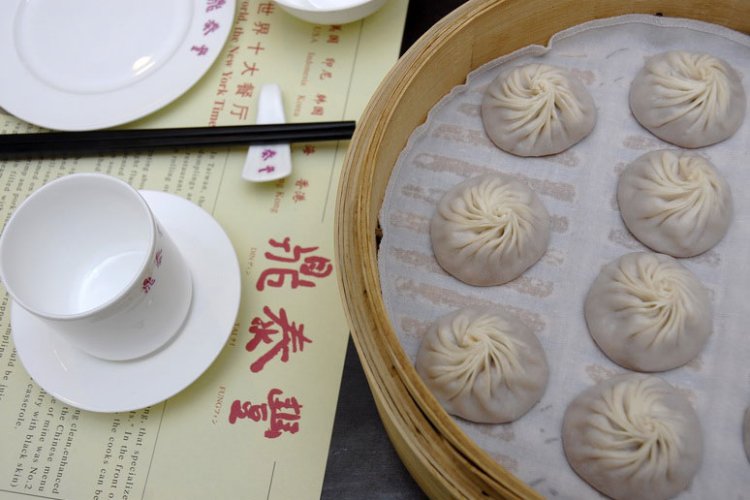Remembering the Man Behind the Delicious Soup Dumplings of Din Tai Fung
On Mar 25, the culinary world mourned the passing of Yang Bingyi, the founder of Din Tai Fung. The renowned restaurant chain, famous for its juicy and mouthwatering steamed soup dumplings, or 小笼包 xiǎolóngbāo in Chinese, shared a statement announcing the peaceful passing of their beloved founder at the age of 96. The family requested a low-key funeral and expressed gratitude for the concern shown by many.
Din Tai Fung has made a significant impact on the global market and is one of the few Chinese food chain brands that has gained recognition overseas. The brand was selected as "one of the top ten gourmet restaurants in the world" by the New York Times in 1993 and listed as one of the best franchises by CNN Travel in 2014. The Wall Street Journal even commented, "尝一口,答案尽在其中 cháng yìkǒu, dá'àn jìn zàiqízhōng" which roughly translates to "Try one bite, and the answer is all there.”

Yang Bingyi's journey to create Din Tai Fung was far from smooth sailing. Born in 1927 in Yuanping City, Shanxi province, he ventured to Taiwan, China at the age of 21 to pursue his dreams. He began his career as a clerk in Heng Tai Feng, a cooking oil company. However, his aspirations were challenged when the company was forced to dissolve due to investment mistakes made by the boss.
In 1958, at the age of 31, Yang Bingyi embarked on a journey to become an entrepreneur. His cooking oil shop, Ding Tai Fung, was named in honor of his former boss at Heng Tai Feng, who had shown him kindness. It quickly became a prototype for what would later become the renowned restaurant chain, Din Tai Fung.

However, the cooking oil business took a hit with the introduction of canned salad oil, forcing Yang Bingyi to pivot his business. In 1972, he and his wife opened a small restaurant on Xinyi Road in Taipei, serving steamed soup dumplings, or xiaolongbao. It was here that Yang Bingyi's commitment to quality and craftsmanship shone through, garnering a reputation among customers.
It wasn't until the 1990s that Din Tai Fung began its foray into the international market. With Yang Bingyi's son, Yang Jihua, taking over management in 1995, the business underwent a transformation from a small snack place to an enterprise management model, resulting in an expansion of its scale.
In 1996, Din Tai Fung opened its first international branch in Shinjuku, Japan, marking the beginning of its overseas ventures. Since then, the restaurant chain has expanded to over 160 branches around the world. In 2000, Din Tai Fung entered the mainland market, opening its first branch in Beijing's Yuyang Hotel in Liangmaqiao in 2004.

Despite Din Tai Fung's expansion as a chain, Yang Bingyi remained steadfast in his commitment to prioritizing the quality of their dishes. For instance, if you visit any Din Tai Fung branch in Beijing and order their 黄金十八褶小笼包 huángjīn shíbā zhé xiǎolóngbāo, the golden steamed bun with 18 folds, you will notice the precision that went into the bun's design. Yang Bingyi carefully studied the number of folds in a xiaolongbao, discovering that too many folds would cause stacked dough and affect its taste, while too few folds would result in a less delicate structure and an unappealing appearance. Thus, the perfect number of folds was determined to be 18.

Apart from their famous xiaolongbao, Din Tai Fung continues to innovate and develop new dishes, such as their pork rib and egg fried rice, Shaoxing wine stir-fried spinach, and fermented glutinous rice balls.
Yang Bingyi's attention to detail extends to the four-step process involved in making each xiaolongbao, which includes cutting out the dough, rolling the wrappers, filling the xiaolongbao, and wrapping them. He set a standard for the diameter of the rolled skin (6.5cm) and the filling weight (16 grams) to ensure consistency in every bite.
To avoid repeating the same job for an extended period, team members work in rotation. This process can be observed through the transparent glass kitchens in any Din Tai Fung store, providing customers with a unique dining experience.

Standardization is not only limited to xiaolongbao but is also seen in other dishes served at Din Tai Fung. Before each dish is served, staff use a thermometer to confirm its temperature, ensuring optimal enjoyment for the guests. For example, the hot and sour soup and Yuanzhong chicken soup are served at 85 degrees Celsius, preventing any burns to the mouth. Yang Bingyi's commitment to consistency and quality has set Din Tai Fung apart, making it a global culinary icon.
Din Tai Fung has cemented its position in the restaurant industry through its exceptional attention to detail and precise operation. It is not uncommon to see groups of eager customers waiting outside the restaurant's doors for a table. In 2021, Din Tai Fung's revenue reached an impressive RMB 1.05 billion, a testament to its popularity and success.
In the words of Mr. Yan Changshou, president of Yadu Hotel: "Whenever international friends come to Taipei, the first thing they ask me is not about Alishan nor Taipei’s Forbidden City. It is about Din Tai Fung." He goes on to assert that the restaurant has the unique ability to spread food culture worldwide, making it a model of Chinese cultural entrepreneurial spirit. Undoubtedly, Din Tai Fung's innovative approach to culinary excellence has put it on the global map, and it stands as a source of pride for the Chinese people.
Read: Eating and Drinking Around the Sanlitun Embassy Area, Pt.2
Images: Din Tai Fung







